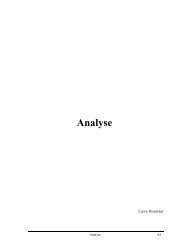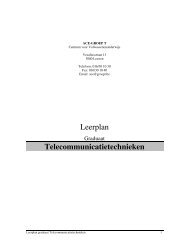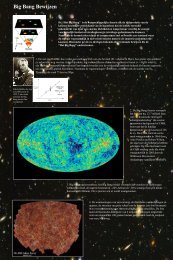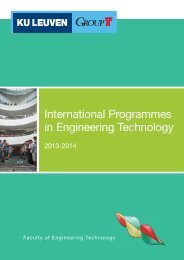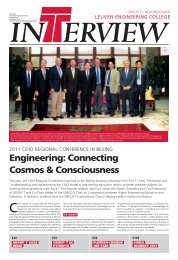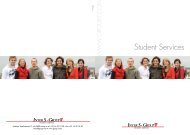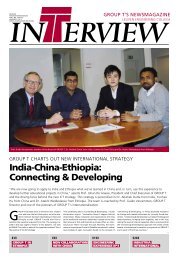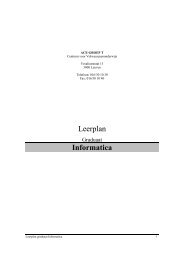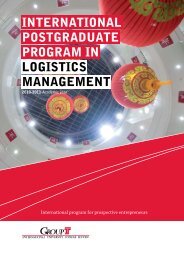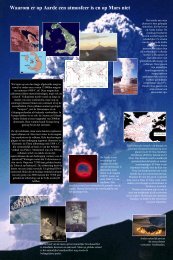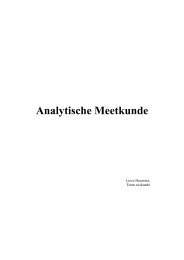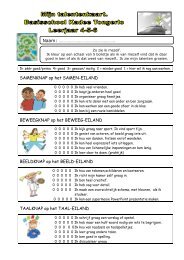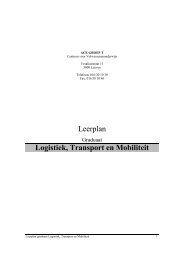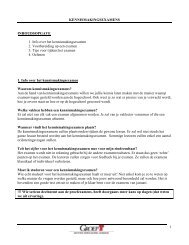EXPLORING EDUCATION SYLLABUS - Groep T
EXPLORING EDUCATION SYLLABUS - Groep T
EXPLORING EDUCATION SYLLABUS - Groep T
You also want an ePaper? Increase the reach of your titles
YUMPU automatically turns print PDFs into web optimized ePapers that Google loves.
( IEC<br />
Undergraduate Certificate (30 ECTS)<br />
<strong>EXPLORING</strong> <strong>EDUCATION</strong><br />
Based on the ‘Four Pillars of Education’ of<br />
<strong>SYLLABUS</strong><br />
Spring
IEC - International Educating Class – Spring<br />
This syllabus applies to the following categories of students:<br />
EIEC:<br />
UIEC:<br />
IEC:<br />
Exchange International Educating Class (Erasmus students)<br />
Undergraduate program International students<br />
GROUP T third-year BA students<br />
1
IEC - International Educating Class – Spring<br />
TABLE OF CONTENTS<br />
OBJECTIVES: What can IEC do for you? .................................................................................................................. 4<br />
PROGRAM COMPONENTS: What does this program look like?............................................................................. 5<br />
CORE MODULES<br />
LEARNING TO KNOW<br />
Capacity building and learning strategies for innovation (3 ECTS) .................................................................... 65<br />
Course description .............................................................................................................................................. 5<br />
Teaching .............................................................................................................................................................. 5<br />
Learning outcomes ............................................................................................................................................. 5<br />
Global education networks and agencies (3 ECTS)................................................................................................ 7<br />
Course description .............................................................................................................................................. 7<br />
Teaching .............................................................................................................................................................. 7<br />
Learning outcomes ............................................................................................................................................. 8<br />
LEARNING TO DO<br />
Educational planning, implementation and evaluation: (3 ECTS) ........................................................................ 9<br />
Course description .............................................................................................................................................. 9<br />
Teaching .............................................................................................................................................................. 9<br />
Learning outcomes ............................................................................................................................................. 9<br />
Educational planning, implementation and evaluation: internship (3 ECTS) .................................................... 11<br />
Course description ............................................................................................................................................ 11<br />
Teaching ............................................................................................................................................................ 11<br />
Learning outcomes ........................................................................................................................................... 11<br />
LEARNING TO LIVE TOGETHER<br />
Living together in 2025 (3 ECTS) .......................................................................................................................... 12<br />
Course description ............................................................................................................................................ 12<br />
Teaching ............................................................................................................................................................ 12<br />
Learning outcomes ........................................................................................................................................... 12<br />
Education, Society and Intercultural dialogue (3 ECTS) ...................................................................................... 13<br />
Course description ............................................................................................................................................ 13<br />
Teaching ............................................................................................................................................................ 13<br />
Learning outcomes ........................................................................................................................................... 14<br />
LEARNING TO BE<br />
On becoming a person (6 ECTS) ........................................................................................................................... 15<br />
Course description ............................................................................................................................................ 15<br />
Teaching ............................................................................................................................................................ 15<br />
Learning outcomes ........................................................................................................................................... 15<br />
2
IEC - International Educating Class – Spring<br />
EXTENSION MODULES<br />
Language - Code & Culture (3 ECTS)..................................................................................................................... 17<br />
Course description ............................................................................................................................................ 17<br />
Teaching ............................................................................................................................................................ 17<br />
Chinese language and culture: a touch of China (3 ECTS) ................................................................................... 19<br />
Course description ............................................................................................................................................ 19<br />
Teaching ............................................................................................................................................................ 19<br />
GROUP T ............................................................................................................................................................... 20<br />
UNESCO’s Four Pillars of Education .................................................................................................................... 21<br />
3
IEC - International Educating Class – Spring<br />
OBJECTIVES<br />
WHAT CAN IEC DO FOR YOU?<br />
As IEC participants, you will share a common ambition: to find new ways to creatively respond to<br />
the current needs of your work environments and to think up plausible courses of action for the<br />
future. To guide you in this task, we will take UNESCO’s Four Pillars of Education as guiding<br />
principles, namely learning to know, to do, to live together, and to be.<br />
Regardless whether or not you are a teacher, you will be able to use these Four Pillars as tools for<br />
analyzing, fine-tuning, and revitalizing your professional life.<br />
Educating goes beyond formal education. That is why, by approaching life as one educational<br />
journey, you will learn to apply educating competences in all areas and at all stages of your<br />
personal life.<br />
IEC covers two semester programs, which can be taken in any sequence. These semester<br />
programs can also be taken separately as autonomous entities.<br />
This brochure provides information on the Spring semester program, themed ‘Exploring<br />
Education’. In the Fall, we offer its counterpart, themed ‘Enterprising Education’. Each of these<br />
semester programs leads to an undergraduate certificate of 30 ECTS.<br />
4
IEC - International Educating Class – Spring<br />
PROGRAM COMPONENTS<br />
WHAT DOES THIS PROGRAMME LOOK LIKE?<br />
The program in <strong>EXPLORING</strong> <strong>EDUCATION</strong> and its components have been designed and organized<br />
in light of UNESCO’s Four Pillars of Education. This means that all program modules and activities<br />
will fall under one of the pillars.<br />
The modules have been classified as either “L” or “E”. In the “L” modules you will approach the<br />
Four Pillars from the perspective of yourself as learner, while the “E” modules will involve you as<br />
(future) educator.<br />
In order to graduate, you must obtain all 30 ECTS.<br />
* Since the language of instruction is English, it is of vital importance that you have a good command of<br />
the English language. Upon arrival you will be asked to sit an intake to determine your level of proficiency<br />
and see what further language support is needed. If your entry-level is lower than B2 (Common European<br />
Framework of Reference), you will have to follow an English proficiency course with our language<br />
department, ACE (see the section ‘World Languages’).<br />
* TOEIC: You can sit a TOEIC, or Test of English for International Communication, towards the end of the<br />
academic year at a special student price.<br />
5
IEC - International Educating Class – Spring<br />
LEARNING TO KNOW<br />
from a learner perspective<br />
CAPACITY BUILDING AND LEARNING STRATEGIES FOR INNOVATION (3 ECTS)<br />
Instructor:<br />
Milton George<br />
Start date: February 1, 2010<br />
End date: June 30, 2010<br />
Evaluation method: Continuous evaluation and assignments<br />
Contact:<br />
milton.george@groept.be<br />
COURSE DESCRIPTION<br />
In this course students shall gain insights into the six domains of capacity building: Government,<br />
Civil Society, Community Development, Partnerships, Climate Change, and Technology. The<br />
importance of capacity building in developing countries is reflected in the UN Development<br />
Program’s description of its core function: ‘to help develop the capacities required to achieve the<br />
Millennium Development Goals (MDGs)’.<br />
The second part of this course is about innovation. You will acquire proactive hands-on strategies<br />
for learning and performance by constructing laboratories of ideas. The aim is that you discover<br />
the enterprising dimension of education at large, daring to innovate and to challenge other people<br />
to participate. Educational change may be fostered at a regional level through the professional<br />
development of future educators.<br />
TEACHING<br />
The course is based on a combination of lectures, individual study, seminars and independent<br />
projects. In between the in-class group sessions, students will carry out various individual and<br />
small group assignments.<br />
LEARNING OUTCOMES<br />
On completion of the course, students shall be able to grasp, relate, and analyze the concepts<br />
treated in the course, especially those of “capacity building” and “capacity development” as<br />
understood by the UN development program.<br />
By using study cases, the students will learn:<br />
1. To plan human resource development: equipping the project participants with the<br />
understanding, skills and access to information, knowledge and training needed for the<br />
execution of projects<br />
2. To plan organizational development: management structures, processes and procedures<br />
3. To plan institutional and legal framework development.<br />
4. To know the developments in the study of innovation processes<br />
5. To describe and explain the main characteristics of innovation processes in educational<br />
settings and to indicate their main determinants<br />
6. To illustrate an innovation process by referring to a recent national program in their<br />
country of origin<br />
6
IEC - International Educating Class – Spring<br />
TESTIMONIAL<br />
‘The most valuable thing for me about the IEC<br />
program is that it is multicultural, and it is a<br />
learning process of living to together which is<br />
one of the four pillars of education and here we<br />
learn things about others which empower us as<br />
humans to accommodate or tolerate and thereby<br />
we will be able to build a world of peace. My<br />
expectation is that at the end of the program<br />
I will be able to educate those around me one<br />
way or the other to live together in peace and<br />
harmony because without peace there will be no<br />
growth.’<br />
Tim Torlowei<br />
(Nigeria)<br />
7
IEC - International Educating Class – Spring<br />
LEARNING TO KNOW<br />
GLOBAL <strong>EDUCATION</strong> NETWORKS AND AGENCIES (3 ECTS)<br />
from an educator perspective<br />
Instructor:<br />
Kaat Vandensavel<br />
Start date: February 1, 2010<br />
End date: June 30, 2010<br />
Evaluation method: Continuous evaluation and assignments<br />
Contact:<br />
kaat.vandensavel@groept.be<br />
COURSE DESCRIPTION<br />
You will analyze UNESCO’s vision of the Four Pillars of Education, explore its mission to achieve<br />
Education for All by 2015, and gain insight into its ideals: e.g. the fight for equal access to<br />
education at all levels, the promotion of gender equality with regard to curriculum material, or<br />
both the enhancement of the access to information as well as the promotion of information and<br />
media literacy in order to bridge the digital divide.<br />
You will learn about projects aiming at realizing these ideals such as the Associated Schools<br />
Project Network.<br />
Against this background, you will be challenged to define strategies for organizing education in<br />
your own professional life.<br />
TEACHING<br />
Approach<br />
The course is based on a combination of lectures, individual study, seminars, independent<br />
projects, and a visit to the UNESCO Headquarters, the International Institute for Educational<br />
Planning (IIEP) and the Organization for Economic Cooperation and Development (OECD) in Paris.<br />
Contents<br />
The following topics will be dealt with:<br />
1. UNESCO (United Nations Educational, Scientific and Cultural Organization):<br />
1.1. General Introduction<br />
1.2. Four Pillars of education<br />
2. Education (Education for All):<br />
2.1. Early childhood<br />
2.2. Primary education<br />
2.3. Secondary education<br />
2.4. Higher Education<br />
2.5. Teacher education<br />
8
IEC - International Educating Class – Spring<br />
3. Literacy<br />
4. IBE (International Bureau of Education)<br />
5. Curriculum Development<br />
6. Associated Schools (ASP-net)<br />
7. Conclusions<br />
LEARNING OUTCOMES<br />
On completion of the course, students shall be able to analyze, relate to and use the basic concepts<br />
of the course in both their personal as well as their professional life.<br />
TESTIMONIAL<br />
<br />
Classe Internacional de Educação<br />
uma das melhores experiencia da<br />
minha vida, onde nos abre novos<br />
caminhos e novos horizontes para a<br />
nossa vida.<br />
O contacto com outras culturas,<br />
novos conhecimentos de<br />
aprendizagem, novas amizades, novo<br />
estilo de vida e o contacto com a<br />
UNESCO dá-nos uma força<br />
estrondosa para continuarmos a<br />
sonhar com novas ideias e<br />
motivações para uma educação<br />
melhor com vista a um futuro<br />
promissor.<br />
<br />
Gonçalo Gomes<br />
(Portugal)<br />
9
IEC - International Educating Class – Spring<br />
LEARNING TO DO<br />
from a learner perspective<br />
<strong>EDUCATION</strong>AL PLANNING, IMPLEMENTATION AND EVALUATION: (3 ECTS)<br />
Instructor:<br />
Milton George<br />
Start date: February 1, 2010<br />
End date: June 30, 2010<br />
Evaluation method: Continuous evaluation and assignments<br />
Contact:<br />
milton.george@groept.be<br />
COURSE DESCRIPTION<br />
In this course you will equip yourself with the necessary tools to draw up a project. We will<br />
explore present-day educational methods, such as experience-based and problem-based learning,<br />
as well as active learning.<br />
The course will deal with the following themes:<br />
(1) planning a project<br />
(2) setting up a project<br />
(3) managing a project<br />
(4) implementing a project (in an educational setting)<br />
(5) evaluating a project.<br />
During the course itself, you will set up and prepare your own project (see ‘Educational planning,<br />
implementation and evaluation: internship’).<br />
TEACHING<br />
This course centers on your internship and a presentation.<br />
LEARNING OUTCOMES<br />
You will develop planning, executive, and analytical competencies.<br />
10
IEC - International Educating Class – Spring<br />
LEARNING TO DO<br />
<strong>EDUCATION</strong>AL PLANNING, IMPLEMENTATION AND EVALUATION:<br />
INTERNSHIP (3 ECTS)<br />
from an educator perspective<br />
Instructor:<br />
Milton George<br />
Start date: February 1, 2010<br />
End date: June 30, 2010<br />
Evaluation method: Presentation and paper<br />
Contact:<br />
milton.george@groept.be<br />
COURSE DESCRIPTION<br />
You will be doing an internship around the project you prepared in ‘Educational planning,<br />
implementation and evaluation: theory’. You will conduct your project in a concrete learning<br />
setting. You will also be asked to analyze your own performance so that you can better<br />
understand your own learning process, evaluate your results, and suggest alternatives.<br />
This combination of theory, internship, and reflection is meant to help you increase your<br />
metacognitive awareness and competences.<br />
TEACHING<br />
The course is based on a combination of your internship and a presentation.<br />
LEARNING OUTCOMES<br />
The students will develop planning, executive, and analytical competencies.<br />
11
IEC - International Educating Class – Spring<br />
LEARNING TO LIVE TOGETHER<br />
LIVING TOGETHER IN 2025 (3 ECTS)<br />
from a learner perspective<br />
Instructor:<br />
Jan Van Maele<br />
Start date: February 1, 2010<br />
End date: June 30, 2010<br />
Evaluation method: Continuous evaluation and assignments<br />
Contact:<br />
jan.van.maele@groept.be<br />
COURSE DESCRIPTION<br />
In this course you will define a shared vision of (one aspect of) living together in 2025. From the<br />
field of futures studies you will learn to identify the megatrends of today that will shape<br />
tomorrow’s world. By applying the scenario method, you will learn to turn those possible futures<br />
into vivid scenarios and backcast ways to arrive there. Drawing on strategic management theory,<br />
you will finally learn to define paths towards your most desirable visions. In this way, the<br />
exercises in envisioning the future will yield a route planner for navigating the present.<br />
Living together is more than a theme in this course. In addition to constructing knowledge about<br />
living together in 2025, the group will tackle hands-on exercises in learning to live together. As<br />
you envision desirable futures, you will engage in strategic conversation and genuine dialogue<br />
with students from different cultures and backgrounds. As you develop scenarios towards<br />
plausible futures, you will come to terms with promoting values with respect for others. In this<br />
way, this course will help you to strengthen a wide range of faculties, including imagination and<br />
creativity, analytical and synthetic thinking, empathy and pro-activity.<br />
TEACHING<br />
In between the in-class group sessions, students will carry out individual, team and group<br />
assignments.<br />
The course is structured in accordance with the stages of the scenario method.<br />
1. Analysis: brainstorming visions of the future, investigating megatrends, and selecting<br />
driving forces.<br />
2. Development: forming a scenario template, developing the scenarios, and presenting the<br />
scenarios.<br />
3. Reflection: evaluating the scenarios, and charting a course to a desirable common future.<br />
LEARNING OUTCOMES<br />
On completion of the course students will be able:<br />
to articulate shared visions regarding the UNESCO pillar ‘learning to live together’<br />
to put the different steps of the scenario process into practice with a peer-group<br />
to conduct strategic conversations and engage in genuine dialogue<br />
12
IEC - International Educating Class – Spring<br />
LEARNING TO LIVE TOGETHER<br />
<strong>EDUCATION</strong>, SOCIETY AND INTERCULTURAL DIALOGUE (3 ECTS)<br />
from an educator perspective<br />
Instructor:<br />
S. Sergio Scatolini Apostolo<br />
Start date: February 1, 2010<br />
End date: June 30, 2010<br />
Evaluation method: Continuous evaluation and assignments<br />
Contact:<br />
sergio.scatolini@groept.be<br />
COURSE DESCRIPTION<br />
The aim of this course is to zoom in on the socio-economic and cultural aspects of educational<br />
issues in the globalised world. You will gain some perspectives on the dynamic interplay of<br />
global, national, and local forces as they shape the functioning and outcome of educational<br />
systems in specific contexts. Attention will be given to democracy, human rights, ethics, and<br />
international migration. You will be challenged to develop insights, as well as perspective-taking<br />
skills.<br />
The course will deal with the following themes:<br />
1. Education, its function(s) and borders in formal and informal settings<br />
2. The ‘glocal’ society as the matrix of interwoven identities<br />
3. Culture, multiculturalism and interculturality<br />
4. Becoming educators from a UNESCO perspective<br />
TEACHING<br />
In keeping with UNESCO’s Four Pillars of Education, the course will be conducted in a fourfold<br />
way:<br />
1. Learning to know: you will be expected to acquire the necessary knowledge base by<br />
studying the suggested didactic material.<br />
2. Learning to do: you will be asked to analyze and critique the course material, as well as<br />
to relate it to your own experience.<br />
3. Learning to live together: you will be asked to choose one topic and work on it in<br />
groups. The whole group will write down their findings and suggestions and then<br />
present them to the rest of the class.<br />
4. Learning to be: (a) You will be observed during our learning encounters to see how you<br />
are integrating the material covered during the course into your own discourse (what<br />
you accept and what you reject, and why). (b) There will also be a final moment of<br />
evaluation during which you will be given the opportunity to show your mastery of the<br />
newly acquired knowledge base and to apply your competencies to an imaginary study<br />
case.<br />
13
IEC - International Educating Class – Spring<br />
LEARNING OUTCOMES<br />
You will be able to apply the basic competencies to the analysis of the educational practice in your<br />
own work environment as well as in other contexts not directly related to the field of formal<br />
education.<br />
TESTIMONIAL<br />
International Education Class, wat een klas ! Echt alles wat<br />
je je kunt bedenken, zit er in: verschillende culturen, landen,<br />
gewoontes, jong/oud, man/vrouw. En ik vind het geweldig.<br />
Het is echt een ervaring, een kans om zoveel van andere<br />
mensen te kunnen en mogen leren. En iedereen is ook<br />
bereid om iets te vertellen over zijn/haar achtergrond,<br />
ervaringen en verwachtingen.<br />
PIEC werd eigenlijk al heel snel een hechte groep en ik denk<br />
dat het vooral door de introductieweek is gekomen —en<br />
Parijs natuurlijk!<br />
Als ik kijk naar de uitstapjes, praat iedereen met elkaar en<br />
iedereen kent elkaar. Het is altijd gezellig en druk, maar<br />
tijdens de lessen wordt er wel goed opgelet en worden<br />
scherpe vragen gesteld. Tijdens de lessen die we volgen, is<br />
het voor mij soms best pittig om alles in een keer te<br />
begrijpen; gelukkig zijn de leerkrachten allemaal bereid om<br />
te helpen, extra uitleg te geven en om soms even een<br />
stiekem Nederlands woordje er in te gooien. :) Ook leuk is<br />
de verscheidenheid in lessen die we krijgen: leven in 2025,<br />
organiseren van educatie, innovatie en een portfolio maken!<br />
Voor mij is het een uitdaging om nu eens lessen te krijgen<br />
die niet alleen aansluiten op lesgeven, maar die mijn venster<br />
op de wereld vergroten/verbreden.<br />
Mijn verwachtingen na deze studie zijn om mijn eigen<br />
opleiding af te ronden, maar zeker ook rondkijken naar<br />
mogelijkheden m.b.t. UNESCO.<br />
PIEC, we rock!<br />
Mandy Wijnbergen<br />
(The Netherlands)<br />
14
IEC - International Educating Class – Spring<br />
LEARNING TO BE<br />
ON BECOMING A PERSON (6 ECTS)<br />
from a learner and educator perspective<br />
Instructor:<br />
Katrien Mertens<br />
Start date: February 1, 2010<br />
End date: June 30, 2010<br />
Evaluation method: Continuous evaluation and assignments<br />
Contact:<br />
katrien.mertens@groept.be<br />
COURSE DESCRIPTION<br />
IEC-students will continuously be encouraged to discover their potentials, to reveal ‘the treasure<br />
within them’. Important values for learning and educational contexts will be applied in practical<br />
ways to real-life situations. These are the kinds of values that facilitate the process of becoming a<br />
holistic person (both as learner and as educator). Among such values are health and harmony<br />
with nature, truth and wisdom, love and compassion, creativity and appreciation of beauty, peace<br />
and justice, sustainable human development, national unity and global solidarity, as well as global<br />
spirituality.<br />
Students will be asked to keep a learning report, or portfolio, of their targets and experiences<br />
along the way.<br />
TEACHING<br />
This course consists of ten work sessions in which evaluative feedback is given both by costudents<br />
and the instructor. Self-reflection is also required. The students are expected to present<br />
what they have learned in the form of portfolio and explain whether and how they became a<br />
navigator of peace and an agent of positive change.<br />
LEARNING OUTCOMES<br />
This course offers a guideline for reaching our full potential as complete human beings in all our<br />
dimensions, thereby enabling us to develop the courage, wisdom and leadership qualities<br />
required to constructively contribute towards building a culture of peace.<br />
15
IEC - International Educating Class – Spring<br />
TESTIMONIAL<br />
‘This IEC program gave me more chance to<br />
know people and their culture from different<br />
countries. It was both interesting and<br />
challenging to join in this group, because you<br />
knew how much fun and how many<br />
misunderstandings you were probably going to<br />
encounter as you set out to learn and live<br />
together with different people. I've myself<br />
learned a lot from pleasant talks and the<br />
cooperation with my classmates. I really<br />
appreciate their friendliness.’<br />
Lisi Bai<br />
(China)<br />
16
IEC - International Educating Class – Spring<br />
LEARNING TO LIVE TOGETHER<br />
LANGUAGE - CODE & CULTURE (3 ECTS)<br />
from a learner perspective<br />
Instructor:<br />
Joris De Roy<br />
Start date: February 1, 2010<br />
End date: June 30, 2010<br />
Evaluation method: Continuous evaluation and assignments<br />
Contact:<br />
joris.de.roy@groept.be<br />
COURSE DESCRIPTION<br />
General outline<br />
This course is not intended as a ‘course in English’, but rather as a course in language as<br />
communication, illustrated mainly through English. Participants will be asked to apply the<br />
findings of the course to their own native language and present their own findings in class and/or<br />
in a paper.<br />
The main aims are to gain insights into how language in general – and English in particular -<br />
works as a code, and to understand why it is of vital importance to understand the code correctly<br />
in order to effectively pass on information.<br />
In a second step, we will see how a language code is shaped and determined by the culture<br />
underlying the language. It is at this stage that the roles of language and culture in education<br />
become especially significant.<br />
Since the first and foremost medium of education is language (and that of international<br />
education, English), it goes without saying that a thorough knowledge of the interaction between<br />
language, code and culture is an indispensable asset for any teacher in an international context.<br />
A closer look will also be taken at what happens when a foreign language is used to teach mixed<br />
groups, what effects this may have on cross-cultural understanding, and how – in turn – language<br />
itself may be affected in such a context.<br />
TEACHING<br />
Approach<br />
The course is designed in such a way that theoretical lessons will alternate with a hands-on<br />
approach to language by way of set tasks. Participants will be asked to actively contribute to the<br />
weekly sessions by preparing and presenting tasks in which they will compare their mother<br />
tongue to English in different contexts.<br />
17
IEC - International Educating Class – Spring<br />
Contents<br />
The following topics will be dealt with:<br />
[1] Language and Communication – understanding the code<br />
Language as product and shaper of culture, metaphors, jokes, shibboleths, myths, stereotypes and<br />
proverbs<br />
[2] Language Spheres – theory of expanding circles<br />
Language Models – what standard to choose?<br />
[3] Aspects of language<br />
Form, meaning, purpose, register & appropriacy, discourse<br />
[4] Language as Culture<br />
Why do we mean the opposite of what we say? Why will an artificial language never be able to<br />
replace natural language? What are the implications of ‘living language’ on education?<br />
[5] Working with words and meaning<br />
18
IEC - International Educating Class – Spring<br />
LEARNING TO LIVE TOGETHER<br />
CHINESE LANGUAGE AND CULTURE: A TOUCH OF CHINA (3 ECTS)<br />
from a learner perspective<br />
Instructor: Wim Polet (Confucius Institute, Group T)<br />
Start date: February 1, 2010<br />
End date: June 30, 2010<br />
Evaluation method: Participation and paper<br />
Contact:<br />
wim.polet@groupt.be<br />
COURSE DESCRIPTION<br />
This course is intended as an introduction to the Chinese language and culture. It will consist of<br />
three components.<br />
1. General introduction to the geography, history, philosophy, art, and socio-economic<br />
development of China<br />
2. Chinese language: history and structure of the Chinese language (spoken, written en computer<br />
variants), differences from Japanese, and some “survival” dialogues<br />
3. Workshops<br />
Kung Fu and Calligraphy: Calligraphy is the art of writing. Kung Fu refers to a series of<br />
movements similar to boxing, but carried out with weapons. A video demonstrates both.<br />
Questions & Answers About Chinese Ancient Thinkers: The philosophies of Confucius, Laozi,<br />
and Zhuangzi lie at the heart of traditional Chinese culture. Their sayings illustrate their<br />
vision on studying, working, love, and friendship.<br />
Science and Technology: Pictures and moving images show China's contributions to<br />
science. Did you know that paper, gunpowder, the compass, and printing all originated in<br />
China?<br />
Changing Cities: Chinese cities have changed dramatically over the course of the 20th<br />
century. Images from Beijing, Shanghai, Wuhan, Lhasa, and Guangzhou at different<br />
moments in time, illustrate this development.<br />
Chinese Food: Chinese food is known for its longstanding tradition and variety. You will<br />
not be able to sample any food, but you can learn about the 8 Chinese cuisines: Shandong,<br />
Sichuan, Canton, Fujian, Jiangsu, Zhejiang, Hunan, and Anhui.<br />
TEACHING<br />
The theoretical components of the course will alternate with tasks and hands-on activities, all<br />
held on the same day.<br />
19
IEC - International Educating Class – Spring<br />
GROUP T<br />
Who are we? What are our values? What do we represent?<br />
GROUP T’s objective is to provide education in the broadest sense, both locally and globally, from a<br />
plurality of world views. Based on the 5E concept, namely ‘environmenting,’ enterprising, engineering,<br />
educating, and ‘ensembling,’ GROUP T’s mission is educing essence by experiencing existence.<br />
As regards educating, GROUP T aims to develop the person as a whole, referring to UNESCO’s body of<br />
thoughts, the four pillars of education: learning to be, learning to know, learning to do and learning<br />
to live together.<br />
The international nature of GROUP T’s education, research and services is essential. Its international<br />
character includes initiatives like joint organization of education and research projects with<br />
international institutes and services to international institutes, exchange of personnel and students,<br />
development of its own extensions abroad and of extensions of foreign institutes at GROUP T,<br />
development of educational concepts and programs on behalf of international partners, and<br />
organization of education in languages other than Dutch. The use of electronic media as a tool and<br />
English as a language is essential in all this.<br />
www.groupt.be<br />
20
IEC - International Educating Class – Spring<br />
UNESCO’s Four Pillars of Education<br />
The Four Pillars of Education form the basis for the UNESCO report Learning: The Treasure Within.<br />
They cannot be defined separately; they form an integrated whole, complementing and<br />
strengthening each other. Education is, after all, a total experience.<br />
Learning to know lays the foundations of learning throughout life. This pillar refers to the<br />
basic knowledge that we need to be able to understand our environment and to live in<br />
dignity. It is also about arousing curiosity, allowing us to experience the pleasures of<br />
research and discovery. It faces us with the challenge of combining a sufficiently broad<br />
education with the in-depth investigation of selected subjects. Naturally, learning to know<br />
presupposes that we develop the powers of concentration, memory, and thought. In short,<br />
that we learn to learn.<br />
Learning to do. Learning to do refers to the acquisition of practical skills, but also to an<br />
aptitude for teamwork and initiative, and a readiness to take risks. As such, this pillar is<br />
about the competence of putting what we have learned into practice so as to act creatively<br />
on our environment. A variety of situations, often unforeseeable, is bound to arise. When<br />
this happens, learning to do enables us to turn our knowledge into effective innovations.<br />
Learning to live together is the pillar that the UNESCO Commission emphasizes more<br />
than any other. It refers first of all to developing an understanding of others through<br />
dialogue—leading to empathy, respect, and appreciation. Yet if we are to understand<br />
others, we must first know ourselves. Learning to live together is thus also about<br />
recognizing our growing interdependence, about experiencing shared purposes, and about<br />
implementing common projects and a joint future. Only then will it be possible to manage<br />
the inevitable conflicts in a peaceful way.<br />
Learning to be is founded on the fundamental principle that education needs to<br />
contribute to the all-round development of each individual. This pillar deals with the<br />
broadening of care for each aspect of the personality. It deals with giving us the freedom of<br />
thought, feeling, and imagination that we need to act more independently, with more<br />
insight, more critically, and more responsibly. The end of education is to discover and<br />
open the talents which are hidden like a treasure within every person.<br />
21
IEC - International Educating Class – Spring<br />
‘Education is the point at which we decide whether we love<br />
the world enough to assume responsibility for it...’<br />
Hannah Arendt<br />
‘Every truth has four corners: as a teacher I give you one<br />
corner, and it is for you to find the other three.’<br />
Confucius<br />
‘The task of the excellent teacher is to stimulate “apparently<br />
ordinary” people to unusual effort. The tough problem is not<br />
in identifying winners: it is in making winners out of ordinary<br />
people.’<br />
K. Patricia Cross<br />
22
IEC - International Educating Class – Spring<br />
Contact<br />
IEC coordinator:<br />
Milton A. GEORGE<br />
Address:<br />
Tiensevest 60, B-3000 Leuven, Belgium<br />
Telephone: + 32 – (0)16 – 30 11 80<br />
Homepage:<br />
www.groupt.be/eiec<br />
E-mail:<br />
iec@groupt.be<br />
23



